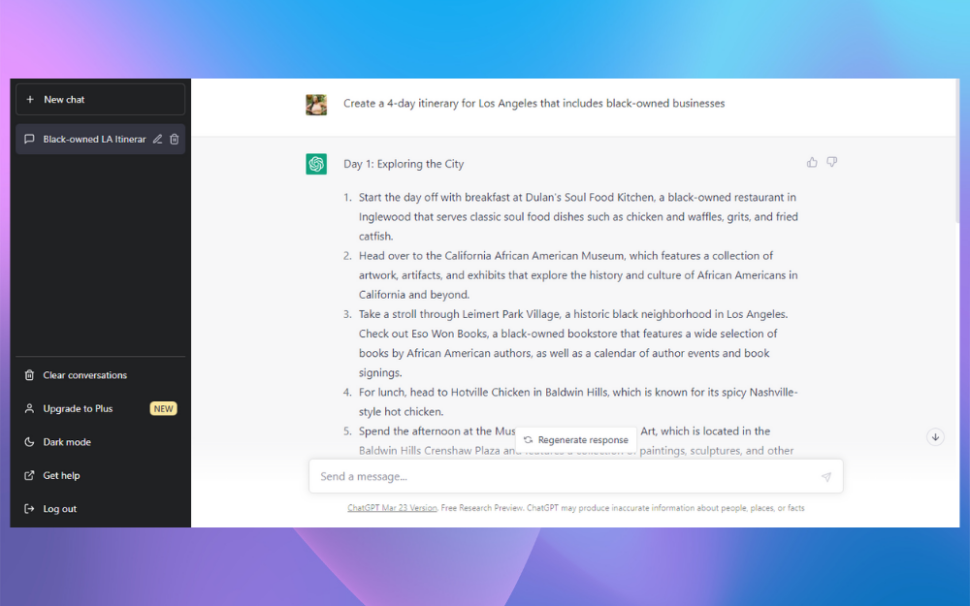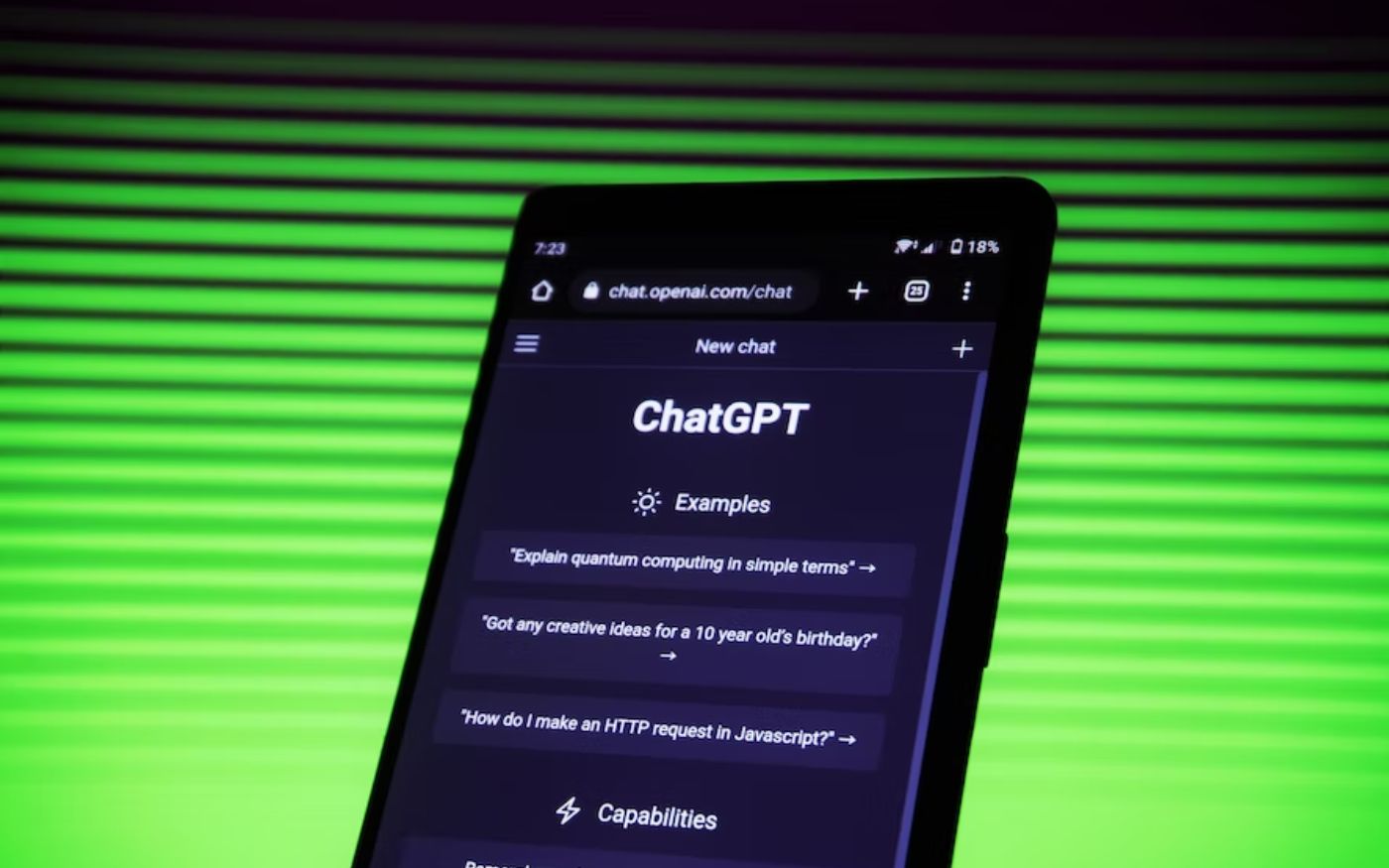Artificial intelligence has entered the building and taken over the conversation. In the quest to accomplish more in less time, tech companies are racing to develop AI technology for the masses. One company, OpenAI, launched its AI chatbot last fall, ChatGPT. The travel industry has been buzzing ever since, wondering how these platforms may impact the future of travel planning.
Though some in the travel industry are expressing concern that the rise of AI technology could replace travel advisors, others are embracing the tool to enhance the travel planning process.
Can AI help you tackle vacation planning, in record time, all on your own? Will ChatGPT get the job done? Or would working with a travel agent fare better?
Let’s look at the pros and cons of using ChatGPT for travel planning.
What Is ChatGPT?
Although the talk of AI software has been trending heavily lately – with ChatGPT leading the pack – it’s possible some are still not familiar with the platform.
ChatGPT is a chatbot and natural language processing tool driven by AI technology. In simpler form, the powerful tool engages in a human-like dialogue based on user-submitted prompts.
For instance, say you want to visit Accra, Ghana but since this is your first time, you’re unsure where to start. With the right prompt, ChatGPT can instantly advise you on the best places to stay, eat, party, and explore. It will also give you helpful insights and tips to help you save money, miss the crowds, and make the most of your trip.
It’s worth mentioning that while the chatbot can assist with your travels, the platform is also a resource for nearly any occasion. Specifically, professionals are using ChatGPT to create content, write essays, and draft cover letters for jobs.
RELATED: These Are The Best Apps For Planning Your Travel Bucket List
The Upside of ChatGPT for Travel
Formerly, the best way to find the best places to travel and activities to experience while in a new location was to search endlessly through reviews and do deep dives on search engines. ChatGPT is able to save both time and effort making a task that was once somewhat tedious and extensive, virtually effortless.
Loads Of Information At Your Fingertips
What makes Chat GPT so powerful is the technology’s ability to process massive amounts of information and provide a clear, detailed response.
With the stroke of a few keys, you can create a list of things to do or places to stay fairly quickly. Instead of scrolling through several pages on a booking site, you can now simply tell ChatGPT the details of what you’re looking for and it will comply, most of the time anyway.
Insanely Fast Responses
The speed at which ChatGPT works is impressive and slightly fun to watch in real-time. Simple queries can take as little as 10-20 seconds. More specific requests may take a bit longer.
Travel Noire tested how the chatbot would respond when asked to create a four-day itinerary that includes Black-owned businesses. Within 60 seconds, ChatGPT replied with Black-owned restaurants, bookstores, and neighborhoods to visit.
Thus, ChatGPT can eliminate hours of scouring the internet to compile a list of things to do. Granted, while some people enjoy the planning process, reclaiming your time in this way can make space for other tasks.
Detailed Responses Simplify Itinerary Planning
During TN’s experiment with the platform, ChatGPT provided a very detailed schedule for a four-day visit to Los Angeles. With the caveat that we wanted to have a Black-owned experience, the recommended itinerary has everything from soul food restaurants to cultural arts centers.
The itinerary even goes as far as to break down each day by morning, afternoon, and evening. Not only is the schedule an exciting list of top Black-owned businesses in LA, but it also provides short explanations for each business.

How do I ask ChatGPT to make an itinerary?
To yield the best results, ensure that you are as specific as possible when asking a question. The more information you can provide ChatGPT about what you want to know, the better the information you will receive back. Also, don’t be afraid to ask complex questions. The AI is programmed to learn from being tested. It also learns from the follow-up question chain of each individual user, so the more questions, the better. Examples of great questions to ask are:
- What are great food tours in (insert city/country)?
- Create the best itinerary within a budget of $600 for (insert place).
- What basic foreign phrases should I learn when traveling to (insert place)?
- How much money should I bring for excursions in (insert place)?
- Can you make a road trip itinerary for going from (insert place) to (insert place)?
- What are the best historical sites to see in (insert place)?
- What is the best transportation method and route for (insert place)?
Where AI Falls Short
AI tools like ChatGPT can certainly assist with sorting through the internet’s endless travel recommendations; however, there are a few glaring ways the technology can’t replace humans — at least not yet.
Great for Planning, Not So Much For Booking
As it stands, the current version of the application is limited in its booking capability. Chat GPT is expanding the platform to empower users to secure travel arrangements via third-party booking websites but, for now, options remain limited. Expedia, for example, now also has a plugin that integrates with ChatGPT so users can transform their chat responses into actual travel bookings.
Compared to working with a travel agent, securing travel arrangements is more do-it-yourself than done-for-you. Travel agents still currently have a leg up because there’s no substitute for customer service from a human. Working with a travel professional can help create a trip made just for you, travel preferences included. In the event of an emergency or change of plans, a travel agent can also guide you through your cancellation or rescheduling.
While the platform is great for planning, the road to a start-to-finish AI travel experience will be a long one.
Limited Planning Capabilities
For now, Chat GPT can only support travel planning through its detailed recommendations and third-party booking integrations. Unlike talking to a human, personalization based on your unique interests may be limited. The nuances of how you and your crew prefer to travel can get lost in the tech matrix.
You could tell the chatbot that Uncle Charlie can’t walk long distances so you need somewhere centrally located. And while you may receive a response with adequate suggestions, working with industry professionals is still favorable for a truly custom itinerary.
Platform Overload Issues
Because the platform is so popular these days, the occasional traffic overload can prevent access to the chatbot. Overwhelming interest and demand intermittently cause the site to produce a network error. This can be a nightmare for someone who wants to get insights for a trip itinerary during a time when the site is at capacity.
Needless to say, the possibilities for how ChatGPT can improve your travel planning are endless. Consider giving it a try the next time you’re in charge of your group’s travel plans.
RELATED: New Travel App ‘Elude’ Matches Travelers With Trips That Fit Their Budget





